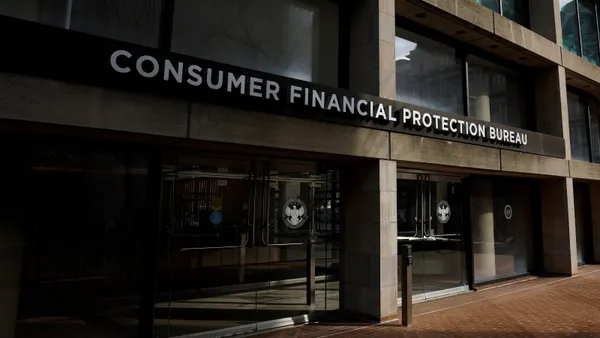Dive Brief:
- The Federal Reserve is investigating a service disruption, which has since been resolved, that delayed transactions Wednesday and Thursday on the central bank’s automated clearinghouse (ACH) system.
- Several banks, including Capital One, tweeted Thursday morning they were experiencing issues. This marks the second significant disruption to a Fed-run payments service this year. The FedWire interbank funds transfer service went down for about three hours April 1, according to Bloomberg. The Fed blamed the April outage on “an internal technical issue.”
- Service disruptions can cost banks both in monetary terms and in customer trust. Both Capital One and digital bank Chime experienced outages over the past two months. BB&T sued its hardware vendor, Hitachi Vantara, last month over a "catastrophic" outage that kept millions of customers from accessing the bank’s online, mobile, ATM and wire transfer services for 15 hours over several days in February 2018.
Dive Insight:
It is not clear how many banks were affected by this week’s Fed glitch, nor was the cause immediately apparent.
Banks send money to each other using the ACH network, which, according to the Fed's website, processes batches of electronic funds transfers such as payroll, Social Security benefits, tax refunds, corporate payments to vendors and utility payments.
"The FedACH Services application began experiencing a disruption on December 18 at 3:30 p.m.," according to a notification posted at 9:57 a.m. Eastern time Thursday on a Fed website. "Payment files and acknowledgments are flowing as of 7:40 a.m. on December 19," it said.
Officials added an update at 1:01 p.m. to confirm the issue had been resolved and to "apologize for the inconvenience and disruption this has caused to your operations."
"The FedACH service, which processes transactions for commercial banks, is currently operating normally after experiencing delays in processing yesterday afternoon and early this morning," Jean Tate, an Atlanta Fed spokeswoman, said in a statement emailed to Bloomberg on Thursday. "Some customers experienced delays in receiving confirmations of yesterday’s transactions. Federal Reserve technical staff continue to investigate the root cause of the issue."
The commercial service handled 58.5 million transactions a day on average last year, with an average value of $1,760, Bloomberg reported.
Service disruptions can cost individual banks, too. BB&T’s 2018 outage cost the bank "about $15 million in lower deposit service charges and about $5 million in higher operating expenses," CFO Daryl Bible told analysts during an April 2018 conference call, according to the Winston-Salem Journal. The bank has spent $300 million to build redundant data systems to prevent a similar outage, CEO Kelly King said, according to American Banker. It is seeking $75,000 in damages from Hitachi Vantara in its lawsuit, but a jury could increase that award.
Capital One's November outage came at a confluence of inconvenient times: a Friday, which is payday for many people — and the first day of the month, when many pay their bills. Customers voiced their frustrations on social media after being unable to make purchases or withdraw funds.
An October glitch at payments platform Galileo halted card transactions and ATM functionality at digital bank Chime and took down the bank’s website.
Fellow challenger bank Varo, which also uses Galileo, experienced minor processing delays because of the incident. But Varo CEO Colin Walsh told Banking Dive it was a net positive, as Chime customers may have brought their business to his company. "It impacted us in a good way," Walsh said. "We got a lot of new customers."












